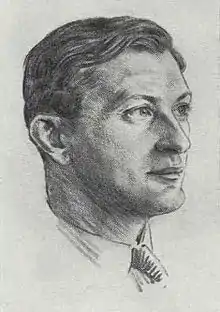
Sketch of Alois Wotawa
Alois Wotawa (11 June 1896 – 12 April 1970) was an Austrian composer of chess problems and endgame studies. He was born and died in Vienna. He was a prosecutor and a member of the Nazi Party.[1]
Composition career
Wotawa composed more than 350 endgame studies, which were published particularly in German-speaking countries. Wotawa also composed some problems that he called "bungled endgames".[2]
In 1966, FIDE honored Wotawa as an International Master of Chess Composition.
Example endgame study
In the following study, White finds an amazing move to force a draw.
Alois Wotawa
Österreichische Schachzeitung, 1952
Österreichische Schachzeitung, 1952
| a | b | c | d | e | f | g | h | ||
| 8 |  | 8 | |||||||
| 7 | 7 | ||||||||
| 6 | 6 | ||||||||
| 5 | 5 | ||||||||
| 4 | 4 | ||||||||
| 3 | 3 | ||||||||
| 2 | 2 | ||||||||
| 1 | 1 | ||||||||
| a | b | c | d | e | f | g | h | ||
White to move and draw
Solution:
1. Ne5 Rd2+
2. Ke3 Re2+
3. Kd4 Rxe5
4. Rf6!! Forks the bishop and rook. If Black protects both with 4...Ra5, 5.Rg6 wins the pawn and draws. There remains only 4...g7xf6 stalemate.
Works
- Alois Wotawa: Auf Spurensuche mit Schachfiguren - 150 Endspielstudien [German language]. Vienna, 1965
References
- ↑ Dwie Twarze Doktora Wotawy by Tomasz Lissowski
- ↑ Source for this and the following: Friedrich Chlubna: An Artist has left us, in: EG Vol. 20, pp. 119 to 121. August 1970 (in PDF at Archived 3 December 2017 at the Wayback Machine.)
This article is issued from Wikipedia. The text is licensed under Creative Commons - Attribution - Sharealike. Additional terms may apply for the media files.